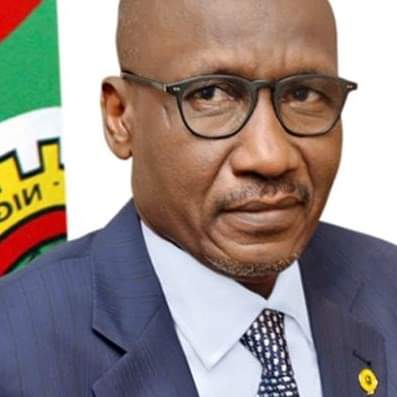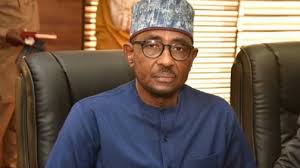Mele Kolo Kyari is driving high performances index in spite of the daunting challenges since assuming the mantle of leadership and has worked assiduously with the corporation and the Nigerian Oil and Gas industry for over 33 years. The reform-minded oil and gas industry technocrat unfolded an agenda for the Nigerian National Petroleum Company (NNPC) Limited’s rebirth, calling it the Transparency, Accountability and Performance Excellence (TAPE), a five-step tracking and strategic road map for NNPC’s attainment of efficiency, effectiveness and global competitiveness and excellence.
He pivoted and pioneered a unique new lease of life in terms of institutional building, infrastructural development; championing a new management of ideas into the next millennium, by driving change and expanding the scope of NNPC’s operations like never before.
For the first time in the history of NNPC, after 43 years, it published its financial account to the public. This is no mean achievement.
Defying all the odds with outstanding financial performance since he assumed office, thereby making his plans very clear, which has also transformed the corporation into a Limited Liability Company in line with the Petroleum Industry Act (PIA) 2021.
These efforts have yielded impressive results, with Nigeria now the largest producer of Liquefied Natural Gas (LNG) in Africa, and one of the top ten producers globally. This feat has earned the country’s gas reserves, estimated at over 200 trillion cubic feet, providing a huge opportunity for growth and development.
This has made Nigeria taken full advantage of the potential. Under Mele Kolo Kyari’s direction and strategic policy template, the NNPC has launched several initiatives, including the Nigerian Petroleum Exchange (NPEX), a platform for trading Nigerian crude oil and other petroleum products and the Nigerian Content Intervention Fund (NCIP), a $200m (200 Dollar million fund) aimed at supporting the development of local content in the industry.
According to Honourable Philip Agbese (APC, Benue), representing Ado/Okpokwu/Ogbadibo Federal Constituency at the House of Representatives, “The biggest legacy has been the approval of fuel subsidy removal which has already saved Nigeria over one trillion Naira (N1trillion).
Hon. Agbese further described the “350MV First Phase of the NNPC Limited Gwagwalada Independent Power Project (GIPP) as the brainchild of Kyari.” This, no doubt, is a legacy that will remain in the footprints of time and future generations of Nigerians.
In view of the foregoing, the attention of the Coalition of over 250 frontline Civil Society Organizations (CSOs), Activists, the Human Rights Community as well as that of Media Executives has been drawn to the recent editorial publication of a mainstream newspaper.
The editorial under reference wilfully maligned the selfless and pivotal sacrifices of the present management of the NNPC and asked for a change in the baton of leadership without taking into consideration the transformative and strategic milestones and achievements recorded since the assumption of Engineer Mele Kolo Kyari’s proactive leadership.
From all indications, there was no iota of truth whatsoever in the editorial, as it lacks merit; it is outright falsehood, mischievous fallacies orchestrated and concocted to deceive the gullible Nigerian public, the African continent that has hopefully look at Nigeria as a “Big Brother.” This editorial falls short of all known rules that guide editorializing, which is supported to be guided by the basic truth, and nothing but the truth.
As Champions and Advocates of Accountability, Transparency and Good Governance practice in public office, it behooves on us, as “custodians of conscience of the people,” to right the wrongs and wholly dispel the negative orchestration and publish the succinct truth for Nigerians to be aware.
In a Press Statement signed by the under-listed executives of the organizations, “Within the first year of managing the NNPC, Engineer Kyari, through cost reduction strategy, was able to reduce NNPC’s losses from N803 billion in 2018 to N1.7 billion in 2019.” This was before the eventual declaration of N287 billion net profit in 2020, a feat hitherto unheard of in the annals of the then Corporation.
The Coalition went on to reveal that the NNPC was able to engage all its contractors and insisted on cutting cost to at least 30 per cent in the 2020 financial period, which pulled down most of its procurement cost by 30 per cent amidst the daunting challenges and harsh operating environment which had tested the resilience of institutions and businesses globally.
Notwithstanding, the NNPC continued to wither the storm by posting a profit of N674.1 billion in the 2021 financial period in view. This positive result came as global economies struggled with reactionary forces and weak economies.
However, in spite of tough and volatile environment, the Company’s investment strategy proved resilient and enabled the National Oil to deliver favourable outcomes during the 2021 financial year. That made the Company to become a CAMA (Companies and Allied Matters Act) registered entity in the same year. This, no doubt, followed the meticulous implementation of the Petroleum Industry Act (PIA).
The group accounts of NNPC was listed by the Price WaterHouseCoopers, SIAO and Muntari Dangana Accounting firms. This financial year of 2021 was the fourth consecutive year that the NNPC would be declaring its financial statement in the public domain. These were the innovative and transformative leadership spearheaded by Engineer Kyari when he took over the affairs of the Company.
Consequently, other factors that contributed to the high profitability of the NNPC was the outcome of the N173.7 billion, arising from the reconciliation with the Federal Inland Revenue Service (FIRS); stronger emphasis on performance management and measurement, rationalization of non-essential expenditure and implementation of the transparency and accountability agenda put in place by him.
There was also rapid increase in the revenue which was attributable to improvement in the production and price of crude oil during the period under review in line with the trajectory role of the leadership and management of TAPE which was the only way to turn around the Corporation’s fortunes and make it relevant and globally competitive, which roadmap ensured and still ensures transparency at maintaining a positive image, shared values of integrity and transparency to all stakeholders.
This occured while the accountability segment of the campaign was to assure compliance with business ethics, policies, regulation and accountability to all stakeholders.
In furtherance of our investigations, we discovered that innovative reforms have been implemented by the Group Chief Executive Officer and are yielding positive results for Nigeria’s oil and gas sector, which plans are centred around operational efficiency and output productivity and transparency for the Limited Liability Company, which was once a cesspool of corruption, and abuse of office.
Under Engineer Kyari, the management has transformed and revolutionized the way the nation produced and distributes its most vital resources, driven by a fierce sense of direction, purpose and an unshakable commitment to excellence and the implementation of a series of bold and innovative reforms that have changed the sector. It entered into partnership with Italian Oil Company, Eni, to rehabilitate and upgrade the refinery with a target of achieving full production capacity by the end of 2023.
These efforts have led to several innovations and initiatives designed to maximize the efficiency and effectiveness of the operations and the establishment of new trading subsidiary, the creation of a new crude oil marketing division, and the implementation of a new performance management system to enhance output and productivity.
Thereby dovetailing into a massive effort to increase domestic gas utilization, reduce its energy mix, reduce also its carbon footprint involving the development of a new gas infrastructure, the expansion of existing facilities and the promotion of gas-based industries such as petrochemicals and fertilizers never envisaged before.
The GIPP project is led by the NNPC in a Joint Venture with China Machinery and Engineering Corporation (CMEC) for the EPC, and General Electric (GE) for the Long Term Service Agreement. This is designed to provide a reliable electricity; strengthen Nigeria’s energy sector and accelerate economic prosperity of the nation and very much on track towards sustainable growth and development.
Nevertheless, it was a known fact that Nigeria’s Extractive Industries Initiative (NEITI), a resource utilization watchdog and the Auditor-General of the Federation, dealing with the NNPC to get it to account for its financial transactions was distressing, because the Company was always recalcitrant in opening up its books for public scrutiny, but with the efforts of Engineer Kyari’s leadership, it all changed overnight, due to transparency, open door policy and for accountability purposes.
The era of opaqueness in managing the affairs of the Company has since ended. This was captured in the five steps for realizing the objectives of TAPE, according to our painstaking investigations which are: The NNPC opens up its systems to public scrutiny; Its operational processes were made transparent and accountable to the Nigerian people; the new systems would operative along with well-defined operational processes, benchmarked against established global best practices by world-class Oil and Gas Companies; set the right operational cost structure, to guarantee value addition towards NNPC’s sustained profitability and set achievable goals; priorities and performance standards and criteria, by developing suitable governance structures for its strategic business units, including the entrenchment of team-spirit, work ethics and collaboration with all key stakeholders to achieve set corporate goals.
With the above templates and innovations put in place, we are rest assured that Nigerians will, indeed, count visible footprints of milestones across all segments of the country’s petroleum industry – Upstream, Downstream, Gas and Power, as well as his interventions in other sectors related to the industry.
The Coalition noted that the AKK Pipeline Project considered to be at the heart of the country’s economic growth posited by the management to see that it is completed by the end of the year. The strategic Fuel Reserve/Refineries’ repairs is another major milestone of the Group Chief Executive Officer built over two billion litres by PMS, the country could fall back on till it was able to import more products, including the involvement of the local workforce, employing graduate trainees and engineers working with the National Engineering and Technical Company (NETCO), the engineering and technical subsidiary.
It is worthy of note, to also state that since the pivotal and proactive management came on board, Regulatory Compliance is topmost and the Implementation of various Financing Reporting Standards (IFRS), as well as Implementing the Centralized Invoice Processing Systems, applications and products to Remitta, SAP Funds Management and others for financial autonomy of the NNPC.
These involve SAP Enterprise Management Software in performance management, procure to pay, travel management to ensure automated and integrated operational processes. The management has also inaugurated the NNPC Delivery Team, charged with the responsibility of ensuring the effective performance tracking of top five priorities across the business, as well as launching the Code of Conduct and TIP Portal.
The Coalition can categorically state that, while expanding the frontiers and infrastructural development of its assets, the Engineer Kyari led management invested in Methanol of $3.6 billion in Bayelsa State, an Integrated Methanol and Gas Project in Odioma, Brass Land, Bayelsa State, which will commence operations next year with an expected production rate of 10,000 tons of Methanol daily.
Another US$260 million Finance Funding Agreement for ANOH Gas Processing Company Limited (AGPC). The project will deliver 300 million standard cubic feet of gas per day and 1,200 megawatts of electricity to the domestic market and the launching of Nigerian Upstream Cost Optimization Programme (NUCOP) to drive the cost of crude oil production in the country, so as to remain competitive in the global market.
During our investigations, we found out that the Kyari-led management was proactive and had a strategic directional policy in place and template that encompasses the NPDC’s growing output, alternative financing deal for NPDC, the revision of unit costs for Joint Ventures, PSCs, sustaining average oil output, investment in Nigeria’s Train 7FID, the completion of power projects met on a ground and recent ones initiated by his leadership, and also the downstream sector covers ground like, Uninterrupted Fuel Supply; “Operation White” entrenching security and deepening of transparency, including the determination of the national daily consumption ratio.
These efforts have also produced refineries rehabilitation, the diversification of the NNPC portfolios, timely remittance of oil revenues to FAAC, revenue optimization and so many other benchmarks and challenges surpassed to make the NNPC a household name, not only in Nigeria, but in Africa, and reviving moribund subsidiaries and the expansion of oil drilling in Kolmani River II and benchmark for legal arbitration and the enhancement of leadership structure for the oil industry, fight against COVID-19, which was a major achievement and efforts that assisted the county to curtail the pandemic, which major funding was sponsored by the NNPC.
The Coalition can also authoritatively attest to the fact that the NNPC’s US$3 billion commitment letter and term-sheet for an emergency crude oil repayment loan has brought with it major advantages, because a fresh injection of US$3 billion into the country’s Foreign Exchange (FX) market would have a far greater impact on the entire economy as it would leverage other market forces and the economy, reduction or no increase in the pump price of petrol; increase the value of the Naira against the US Dollar and other currencies.
These are, indeed, pointers to the immediate benefits of the facility to Nigeria on a sustainable basis and, therefore, should be commended and applauded by well-meaning Nigerians, for the foresight, vision and forthrightness in sourcing the funds in the first place.
We, as well note that, through our painstaking investigations, the NNPC is very much on track towards sustainable growth and development, as it has presently constructed roads networks and rehabilitated over 21 roads under the Federal Government Road Infrastructure Development and Refurbishment Investment Tax Credit Scheme and on Tuesday, 21st December, 2021, it officially handed over N621 billion cheque to the Federal Ministry of Works and Housing.
Presently, the President Bola Ahmed Tinubu administration has removed fuel subsidy and the present management of the NNPC are doing everything possible to regulate, manage, block loopholes used by oil marketers and keep the nation thriving in spite of the enormous challenges of managing issues of fuel subsidy removal, feared by previous administrations.
But, we are assured that by December 2023, the Portharcourt Refinery will be up and running and fully operational, according to the Minister of State, Oil and Gas. The issue of crude oil theft, economic sabotage, pipelines vandalism and smuggling across the borders, has become a major challenge as clandestine refineries are daily operated by saboteurs to cause economic loss running into billions of naira including illegal connections from base stations. The management of the NNPC, Service Chiefs, Minister of Defence and Office of the National Security Adviser (ONSA) are daily working assiduously, strategizing to arrest and prosecute organizations and individuals responsible for the economic theft and diversion of our national resources meant for development of the country.
Accordingly, the NNPC is in collaboration and partnership with civil society organizations (CSOs) and non-governmental organizations (NGOs) across the country in the delivery of their mandates of making government accountable to the people; Freedom of Expression; Freedom of Information; and enshrining good governance practice and accountability, as well as transparency in their operations nationwide, in its day-to-day affairs.
We therefore have no hesitation in passing a resounding Vote of Confidence on Engineer Kyari’s administration. We, as well, call on the International Community, stakeholders and well-meaning Nigerians to continuously support this proactive leadership to enable it further its commitment and efforts to the general good of the nation; reemphasizing that the editorial in reference is, indeed, hogwash, politically motivated, repugnant to natural justice, equity and good conscience. Hence, should be disregarded and discountenanced as fake news, hate speech, wilfully concocted by Fifth Columnists and traducers as well as agent-provocateurs.
Signed:
1. Comrade Umar Farouk, Convener, Africa for Peace Initiative Network (APIN)
2. Comrade Ejikeme Udeh, Secretary, Change Network for Leadership (CNL)
3. Comrade Okoronkwo James, National Coordinator, Peace and Advocacy Initiative (PAI)
4. Comrade Onoja Charles, Esq. Coordinator,Middlebelt Lawyers Forum (MLF)
5. Comrade Adio Wahab Salami, National Coordinator, Workers’ Rights Protection Network (WORP)
6. Comrade Gbenga Ashiru, National President, Amalgamated CSOs of Nigeria (ACN)
7. Comrade Ishaya Issa Saka, President, Coalition of CSOs Against Corruption (CCAC)
8. Omoba Kenneth Aigbegbele, Executive Secretary, Citizens Watch Advocacy Initiative(CWAI) & President, (GOCMEJ).
9. Comrade Johnson Eze,National Coordinator,Network for Change, Good Governance and Leadership (NCGL)
10. Comrade Michael Ekamon,National Convener, South-South Youths for Good Governance (SSYGG)
11. Comrade Gabriel Gwajime, President, Middle Belt Renaissance Group(MBRG)









